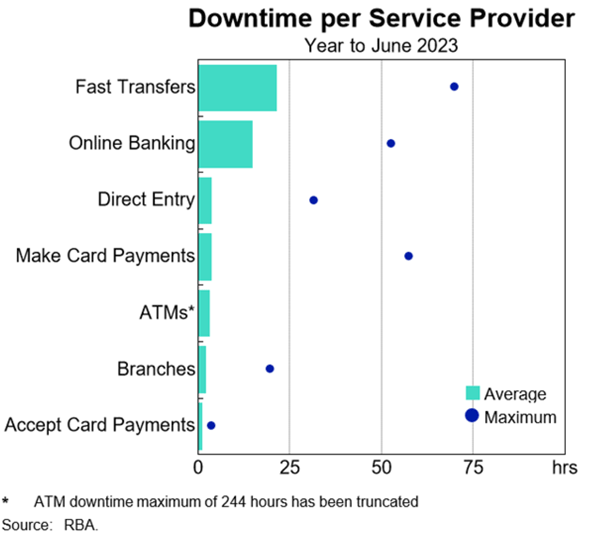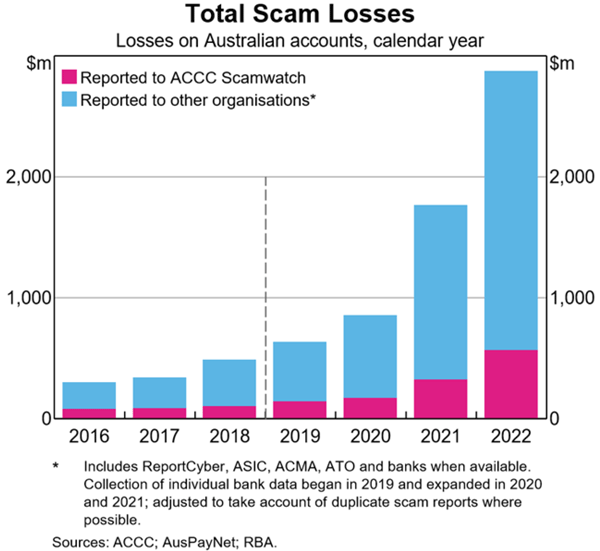Submissions – Payments System Securing Australians’ Superannuation
RBA Submission to Treasury Consultation Paper
Executive Summary
The Reserve Bank of Australia (RBA) is the principal regulator of Australia’s payments system, with a mandate to promote the safety, efficiency and competitiveness of the payments system. This submission focuses on the payment system arrangements needed to support the payday super initiative.
To effectively deliver the Government’s payday super initiative, any payment system facilitating superannuation guarantee (SG) payments must be safe, resilient, fast and connected to all relevant bank accounts. The main two payment systems for account-to-account payments in Australia are the Bulk Electronic Clearing System (BECS) and the New Payments Platform (NPP).
The better long-term solution for delivering payday super will be the NPP; payments sent via the NPP are delivered in real-time 24/7, and the platform can provide real-time confirmation that a payment has been successful. In contrast, BECS is a legacy payment system with limited functionality; it does not support fast payments and does not provide real-time confirmation that a payment has been successful. Given its limitations, AusPayNet is currently consulting on an industry-led transition away from BECS.
To deliver the full benefits of payday super through the NPP, the NPP must have sufficient account reach. The NPP is not currently connected to all relevant bank accounts for funds to be transferred from employers to superannuation funds. Until the NPP is connected to all relevant accounts, a hybrid solution through both BECS and the NPP would be required. However, this is not a viable long- term option due to the transition away from BECS.
The success of the payday super initiative will rely on the safety and resilience of any payment system supporting SG payments. However, the safety and resilience of payment systems such as the NPP are not formally subject to an appropriate form of regulatory oversight. The RBA needs a clear legislative basis to conduct supervision applying principles designed to ensure that payment system operators are managing risk in a manner consistent with international best practice.
To meet the Government’s 2026 implementation timeline for payday super, while providing certainty and clarity to all stakeholders, these challenges need to be addressed as soon as possible.
Criteria for a single payment platform for payday super
Neither BECS nor NPP currently provide all the features needed to deliver the full benefit of the Government’s proposed reform over the long term. Specifically:
- All relevant employer and super fund accounts need to be connected to the payment system being used for payday super - The payment system facilitating SG payments must be able to connect all relevant employer accounts to super fund accounts, so that payday super is available for all Australians.
- Payments need to arrive in the super fund’s account quickly and the employer needs to know that the payment has been successful - To maximise the benefits of payday super for employees, an SG payment must be paid into the employee’s super account as quickly as possible. The payments platform should also facilitate timely confirmation to employers that the payment has been successful.
- Payday super solutions should be built on a modern payment system - If the payday super initiative is to meet its objectives, including being able to adapt to changes and innovations over time, it should be delivered using a modern payment system, with richer functionality.
All employer and super fund accounts need to be connected to the payment system being used for payday super
For any payment system to be the sole one through which SG payments are processed, it must be able to facilitate payments from all employer accounts to all super fund accounts. BECS payments can reach any account with a valid BSB and account number, including super fund accounts. The NPP, which was launched in 2018, is not currently available to all relevant accounts.
There are two account reach issues. First, some financial institutions that are connected to the NPP have not yet made all accounts reachable via the NPP. Second, there are financial institutions that have not yet connected to the NPP at all, meaning none of their accounts can be reached via the NPP. These non-connected institutions tend to be small, but they are likely to have some customers who are employers that need to make SG payments.
Until these accessibility issues are resolved, the NPP would not be ready to be the sole SG payment platform solution. Considerable investment and uplift are needed to address these issues and it is possible that not all financial institutions will have connected to the NPP and completed the necessary integration work to process SG payments on the NPP by 1 July 2026.
The RBA has sought information about progress in making accounts NPP reachable and will be engaging with NPP participants about their plans to address the issue. The RBA is also engaging with a number of institutions that are not yet connected to the NPP to discuss their plans to make NPP services available to their customers.
Payments need to arrive in the super fund’s account quickly and the employer needs to know the payment has been successful
Any payment system used to make SG payments consistent with the Government’s payday super policy should support fast payments and provide employers with visibility that the payment has been successful so that employers can be sure that they are meeting their obligations.
The NPP enables payments to be processed on a real-time, 24/7 basis. This means that the NPP could be used to:
- support the fast transfer of SG payments from the employer’s account to the employee’s super fund account
- support the flow of payments made outside business hours and avoid processing delays due to public holidays or weekends
- facilitate confirmation to employers that a payment has been successful, so that unsuccessful payments are identified sooner and resolved more quickly.
By contrast, BECS (currently used to process the majority of SG payments) operates a deferred settlement model, where payments are settled as part of a scheduled intraday netted multilateral settlement on business days only. While BECS transactions are typically settled on the same day, they can take up to three business days. Payments, including SG payments, processed through BECS can potentially take even longer to settle, depending on weekends and public holidays. There is also no way of confirming that a BECS payment has been successful at the time the payment is made; the payer is only notified on a delayed basis if the payment is rejected.
Payday super solutions should be built on a modern payment system
If the payday super solution is to be fit for purpose, and able to adapt to changes and innovations over time, it should be delivered using a modern payment system with rich functionality. BECS does not offer a long-term solution. The technical capacity of BECS has been superseded and its functionality is limited. The RBA supports industry efforts to manage the transition away from BECS payments, noting the importance of constructive engagement and careful planning by all stakeholders.
BECS was built nearly 30 years ago and it has limitations that reflect the time when it was created. For example, BECS uses a restricted messaging format that is incompatible with the modern ISO 20022 standard that is being adopted around the world. NPP’s design and functionality mean that it should be well placed to integrate with other systems and adapt to innovations over the long term.
Given the limitations of BECS and the cost of upgrading it, industry is considering how the system could be wound down and eventually retired. AusPayNet, the industry body which administers BECS, is currently consulting with industry and key users on the future of BECS, including feasible timeframes or preconditions for transitioning different transaction types onto alternative payment systems. A plan for this transition is expected to be published in late 2023. It will be crucial for all stakeholders to engage constructively on the transition process, including to address key practical hurdles for moving SG payments to another payment platform such as the NPP.
Need for supervisory powers to promote the safety and resilience of payment systems
Australians need to have confidence that the payment systems facilitating SG payments are safe and reliable. If the payment systems supporting SG payments are not held to appropriate standards of safety and resilience, there is a higher risk that SG payments could be delayed by outages or subject to fraud or scams.
Reliability and security problems can impose significant costs on end users, resulting in economic disruption and undermining public confidence in the financial system. While fast payments confer many benefits, data collated by the RBA from banks and other financial institutions show that the average downtime for retail payment services such as fast transfers tends to be higher than for other payment services (Graph 1). Similarly, the incidence of scams and fraud across all payment services has increased significantly in recent years (Graph 2).


One of the Government’s key priorities in the Strategic Plan for Australia’s Payments System is to promote a safe and resilient system. One of the initiatives under this priority is for the RBA to supervise prominent payment systems, such as the NPP, where outages could cause serious disruption to the economy and undermine confidence in the financial system. Such supervision would occur under a framework based on internationally recognised principles for the effective management of risks faced by financial market infrastructures.[1]
The RBA has been engaging with industry on this initiative. A key issue highlighted through this industry consultation is that, while the RBA has formal powers under the Payment Systems (Regulation Act) 1998 to designate a payment system and set standards to be complied with by participants in the system, those powers are not well suited to supervision applying risk-based principles. The RBA has concluded that it will be challenging to effectively supervise the safety and resilience of payment systems operated by the private sector under a principles-based framework without a clear legislative basis.[2] The RBA recommends that the Government introduce legislation empowering the RBA to:
- set principles for the payment system operator to promote safety and resilience
- obtain information relating to the payment system to ensure an open and ongoing supervisory dialogue
- assess observance with the principles set by the RBA and direct the payment system operator to take steps to observe the principles.
The RBA would need these formal supervisory powers as soon as possible to ensure the relevant payment systems processing SG payments are best placed to support the Government’s 2026 implementation timeline. This would enable the RBA to proceed with implementing a supervisory framework, building understanding of the obligations among industry, identifying gaps in compliance and supporting the uplift of risk management practices at the relevant payment systems.
Endnotes
The Principles for Financial Markets Infrastructures, issued by the Committee on Payments and Market Infrastructures and the International Organization of Securities Commissions, are widely used internationally by authorities, including the RBA, to assess the effectiveness of the risk management practices of financial market infrastructures, including payment systems. [1]
The RBA is the relevant Commonwealth Regulator for payment systems under the Security and Critical Infrastructure Act (SOCI). However, the SOCI framework does not comprehensively address all the risks faced by payment systems and does not empower the RBA to supervise payment systems. [2]